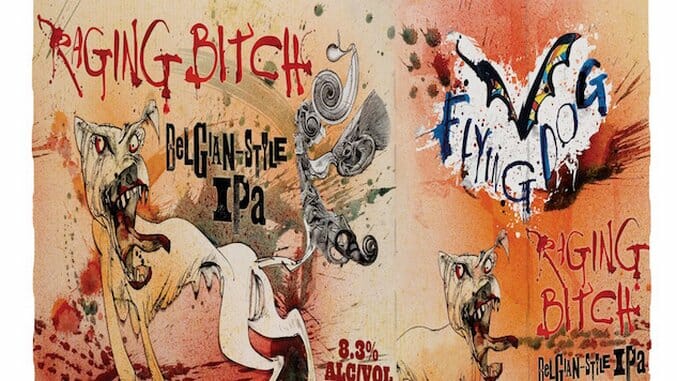How Flying Dog’s Raging Bitch Sparked a Free Speech Movement
Flying Dog
On the surface, being a brewer looks like one of those rock star jobs, but the minutiae of running a brewery can be tedious, particularly since post-prohibition policies create pitfalls that can get breweries in trouble. After submitting routine label approval paperwork to the various state governments for Raging Bitch IPA in 2009, the staff at Flying Dog Brewery got a call from the state of Michigan threatening to involve the state police if bottles of the beer showed up on shelves in the Wolverine State. The label, which featured the name for a female dog and artwork by Hunter S. Thompson illustrator Ralph Steadman, was deemed “detrimental to the health, safety and welfare of the people of Michigan” by a three-member panel of the state’s Liquor Control Commission that also made a point of saying that their decision, “was not about the First Amendment.”
What followed was a legal odyssey that pitted the Maryland-based brewery against the state of Michigan in a fight over free speech. Despite the commission overturning the original decision in what it called a “routine review,” Flying Dog CEO Jim Caruso pressed on to make a point. After finally recovering $40,000 in damages in federal court, the brewery decided to use that money to establish an advocacy group outside the brewery called the 1st Amendment Society, which they’ll formally launch at the National Press Club on May 31. Caruso was kind enough to tell us about the organization and why this fight was so important.
Paste: You’re currently expanding as a brewery, so it had to be awfully tempting to put that money into those projects. What made you set this amount aside to start this society?
Jim Caruso: There are all sorts of abuses of power like Wall Street and other financial and corporate abuses where people do things wrong, but the most frightening and worrisome abuse of power is when the government abuses its power. The reason I say that is because it’s outrageously hard to sue the state or federal governments for violating our First Amendment rights. Michigan got away with this for so long because it’s so hard to sue them. From day one I said, “this isn’t about damages, you lifted the ban and my damages aren’t that great. Just settle for one dollar,” and I said this throughout the process, “but you have to acknowledge the violation of our First Amendment rights,” and they just would not do it.
We ended up at the federal level, and the US Court of Appeals said [Michigan] violated our rights, and that was the victory that we were looking for. I never wanted this to be about arguing our losses, and our analysis was very conservative. You could have argued that our damages were a lot higher. It was a case that was never about compensatory damages, it was about standing up when the state violates your constitutional rights. This outrageous behavior goes on in other states, so it was important to us that this happened at the federal level. We were awarded damages, and it was my intention to always do something good with them.
Paste: Doesn’t it almost seem appropriate that a brewery with ties to Hunter S. Thompson found itself in this situation?
JC: It sure does. The 1st Amendment Society that we’ve created is going to have a banned book club. It surprised me that Harry Potter and the Sorcerer’s Stone is the most banned book in America, but my brother was expelled in the late ‘60s for having a copy of Thompson’s Hell’s Angels book. For us, you look at the freedom of speech, and it’s not the most important constitutional freedom. It’s always in the news, so it has some political value. We have a world-renowned artist in Ralph Steadman who does our label art. We just had his 80th birthday party in London with hundreds of people from all over the world honoring his art, but the state of Michigan objects to it.